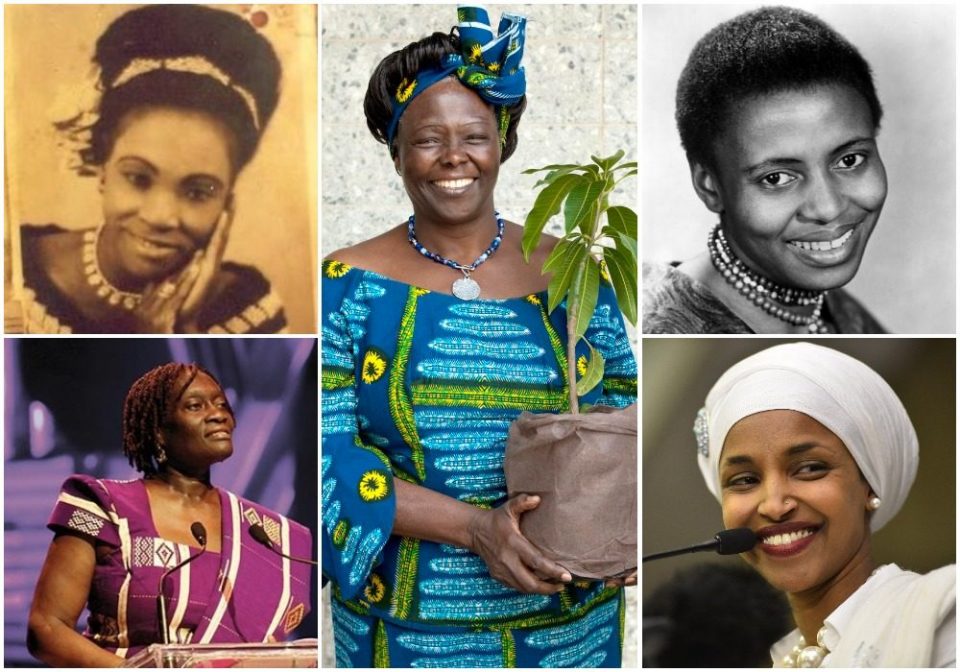
5 Inspiring African Women to Celebrate Women’s Day 2019
March is Women’s History Month, with International Women’s Day being celebrated on March 8. African women are often left out of many of these conversations. This is why I bring to you 5 African women you should know.
1. Prof. Wangari Maathai (Kenya)

Wangari Maathai was an acclaimed Kenyan feminist, political activist, and environmentalist. She held a BSc. in Biology, an MSc. in Biological Sciences, and a PhD in Veterinary Anatomy. In 1977, she formed the Green Belt Movement; a movement dedicated to planting trees, environmental conservation, and women’s rights. When Moi’s government endeavoured to build a skyscraper on a public park, she objected and campaigned against it. Not only that, she led the Green Belt Movement in registering voters and also led the charge in campaigning for constitutional reforms and freedom of expression. She was outspoken about voter rights and accused the government of rigging elections to stay in power. Moi’s government, an authoritarian regime, opposed many of the movement’s positions on democratic rights and came down on her full force.
Due to her activism, Wangari was vilified in the media. She is quoted saying, “They can’t stand a woman who stands up. I’m being seen as an arrogant woman because I dare to object. I call them arrogant.” The government referred to her in the media as a “crazy woman”. Despite being vilified and even threatened (her name was on an assassination list in 1992), Wangari Maathai never backed down. She continued her work, even when she was in hiding. She was arrested several times. She was instrumental in NARC’s victory over Moi’s regime in 2002. She ran for MP in Tetu Constituency and won. She went on to become the first ever African woman to win the Nobel Peace Prize. She died of ovarian cancer in 2011, leaving behind a rich legacy. The Green Belt Movement still lives on.
2. Theo Sowa (Ghana)

Theo Sowa is an adviser working on international issues with a focus on social development issues. She is the CEO of the African Women’s Development Fund. She has worked is outspoken about the treatment of women and children and has criticised the Nigerian government for failing to respond on the issue of the missing Chibok girls. She has worked for UNICEF, the AU, and UNDP, among others. She is named as one of Africa’s greatest feminists.
3. Ilhan Omar (U.S.)

Ilham Omar is a Somali-American politician. She is currently serving as the US representative for Minnesota’s 5th congressional district. Ilhan was born in Somalia and her family escaped the country as refugees and stayed in Dadaab Refugee Camp in Kenya before relocation to the U.S. She is the first Somali-American elected to a legislative office in the U.S, one of the first two Muslim women elected to Congress, and the first non-white woman to serve as a representative from Minnesota. Her platform is based on a living wage, affordable housing, affordable healthcare, student debt loan forgiveness, DACA protection, and the abolition of ICE. As a Somali-American, she has had to face not just racism, but also sexism and Islamophobia. A clear example of Islamophobia against Ilhan is the recent anti-Muslim poster drawn linking her to the 9/11 bombings.
4. Miriam Makeba (South Africa)

Nicknamed ‘Mama Africa’, Miriam Makeba was a South African singer who was very outspoken against apartheid. She was involved in radical activity against the oppressive system and was quoted saying “Everybody now admits that apartheid was wrong, and all I did was tell the people who wanted to know where I come from how we lived in South Africa. I just told the world the truth. And if my truth then becomes political, I can’t do anything about that.” She was also a part of the Civil Rights Movement and the Black Panther party.
Miriam married Stokely Carmichael, a leader of the Black Panther party, leading the white American majority to turn against her. She also faced hostility from the American government and she and her husband had to leave for Guinea. She returned to South Africa after apartheid was dismantled in 1994. Her music was explicitly and unapologetically political and she used her career as a singer to do her activism. She was present at many of Africa’s independence celebrations where she was invited to sing. She even sang at the inauguration of the African Union. She had 9 passports and had honorary citizenship in 10 countries. In 2008, she suffered a heart attack and consequently died.
5. Margaret Ekpo (Nigeria)

Margaret Ekpo was a women’s rights activist. She was famous for using her clothes to send a message – she was often in African wear, wearing traditional clothes and plaiting her hair to send a pro-African message. She created the Market Women Association in Aba to unionize market women in Aba, a platform she used to promote women solidarity in the fight for women’s economic and political rights. She was determined to fight the role colonialism played in the subjugation of women. She joined the National Council of Nigeria and the Cameroons and called for decolonization. She also protested the killings at Enugu coal mines and created the Aba Women’s Township Association and mobilised women to vote. She won a seat in the Eastern Regional House of Assembly where she continued her work.

